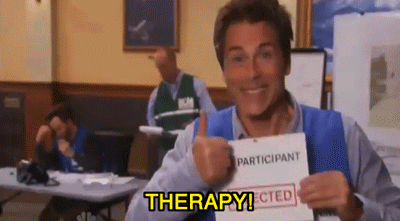This is the free version of Evil Witches but it would be very cool of you to please consider becoming a paid subscriber to support the work you’re about to read. Thanks!
Sometimes I get really bad press releases. Other times I get timely, useful ones like a recent email offering me the chance to interview psychiatrists Carlin Barnes, MD and Marketa Wills, MD, MBA about anxiety around parent-rearing and current events. Before I had the chance to run that interview, a friend introduced me to Dr. Christine Coleman LMFT, PhD, a licensed doctor of marriage and family therapy in San Francisco who specializes in clients of color (whom she also helps via her nonprofit.) Dr. Coleman and I had a very 2020 Zoom chat about mental health with her 2 year old and 6 month old on the call and me pausing to take a disembodied stuffed animal’s squeaker out of my dog’s mouth.
Here are some of the family-type mental health questions I had for the doctors and answers they had for me—hope some of this helps someone!
How should working parents approach choosing between their work and quality time with the kids at home this summer?
Drs. Barnes and Wills: As kids are out of school with presumably less structure in their days, mom and dad may find it difficult to continue to balance work from home (or even outside of the home) with keeping the kids entertained. These novel scenarios bring about new complex feelings as families navigate the new normal. One such feeling that may arise is that of guilt between choosing work over time with kids even though everyone is in the same house. It is important to realize that these are valid feelings. Discuss these concerns with your child. Ensure them that quality time is important and a priority. Enlist them in planning activities and tasks to add structure to their days while you are away at work. Also, set good boundaries around your work territory in the house and how and under what circumstances you should be interrupted from work. Remember you are role modeling good work ethics to your child.
How can parents get a healthy, rational perspective about what school will look like this fall, and get the kids on board too?
Drs. Barnes and Wills: Regularly monitor communications from your child’s school regarding upcoming plans for the new school year (and summer class programs). Many schools and universities are making decisions as they receive up-to-date information from scientists, epidemiologists, and educators. Be patient and flexible, and model these qualities for your child. Oftentimes, worrying about the unknown creates more stress and anxiety.
Many parents have a knee-jerk and immediate response to have their student continue to shelter in place until there is a vaccine for the novel coronavirus, or there are effective therapeutics, or things just feel less crisis-ridden. Others are more prone to allow their students back into school as school districts open up. Both sides of the spectrum are valid responses given the degree of uncertainty we are experiencing as we move through the pandemic. Health and safety are extremely important and should be central to your decision making for you and your family.
If your student is mature enough to weigh in on this matter, explore his thoughts. Many students not only report that they miss the regular, daily contact with friends and teachers but they also much prefer the traditional learning models. Overwhelmingly, most students express that they want to return to school campuses. For those students who are have concerns about returning to campus, explore their concerns. If there is a concern for significant anxiety, seek professional help.
Practice self-care (mindfulness, meditation, yoga, exercise, adequate sleep). It is important to realize the difference between normal worry and valid concerns and anxiety that is problematic. If you are worrying excessively or unable to control the worries that you have regarding your child returning to school, we recommend that you seek help from a medical professional. How you manage your anxiety impacts the emotional health and wellness of your child.
What do you tell parents with concerns about COVID who have kids who want to attend a social justice protest? What’s your general advice for parents addressing kids’ potential anxiety right now over police brutality, political unrest and other alarming current events?
Drs. Barnes and Wills:
Address your child’s potential anxiety by asking your child how they are feeling and what they know and understands about the current civil unrest. Let your child’s answer frame and guide your response.
Be curious about what may be prompting your child’s anxiety. Are friends, the media, social media giving information and messages that warrant a deeper conversation? Understanding and validation of these feelings is critical.
Aim to broaden the conversation to include the societal context of racism and injustice in a developmentally and age appropriate manner.
Limit exposure and media coverage of overly graphic and violent content.
If you and/or your child want to go to a protest, be informed about the specifics of the protest (time, location, etc). Choose protests that are less likely to turn unruly or violent. Explore your child’s feelings regarding possible participation and honor those feelings. Be safe, wear a mask and stay socially distanced.
How do you coach your parent patients concerned about how to stay engaged with current events right now but also cautious about reserving energy for work, family, self-care and so on?
Dr. Coleman: Between COVID, between Black Lives Matter and the rest of the news, and being in touch with people and these Zoom calls—there's just so much burnout. I tend to ask clients, "What do you feel within your body?" Because we have the physiological responses. I feel it myself sometimes like, "Oh my gosh, my head is pounding, my eyes hurt, my body is tensed up." It might be social media, it might be that parent or relative that's driving us nuts, it might be our spouse, it might be our children. Learning how to switch things on and off and removing guilt is something we work on.
There are Black people in particular who may think, "I want to be a part of this movement, but it's so difficult to watch people die on camera.” And others may worry, "Why are people not taking COVID as seriously as they should be?” Or, “Why are they taking it so seriously?" There's just a lot of divide right now, and a lot of it is social media driven and media driven in particular. I coach my clients on being mindful and how to tune certain things out.
I think harm reduction is used a lot to talk about addictive behaviors, but it can be used in the context of media and what we absorb, text messaging, just engagement with relationships. Can we commit to not checking our phone first thing in the morning? Can we commit to what's the max hours that you want to be engaged? When you're not engaged, what are you doing for self care to make sure that you are not always reminiscing about the pain and the tragedy?
And then one thing that's been helpful for me to hear, especially from the Black community, is when Black people connect to try to talk about things other than the current events of Black Lives Matter and civil rights. Finding good harmony. Yes, talking about certain things when it's time to talk about that, but then also finding space to celebrate things. Talk about joy, laughter, and things that are not so heavy can really be life-giving and re-centering.
What do you tell patients who wonder about how to reserve time and energy for themselves and their family while also supporting their friends who might be struggling deeply right now?
Dr. Coleman: I think it could be fair to assume that at times women tend to be more gravitational towards helping and being present for our friends and our relationships. And so that can show up, especially in times like this, and then it's hard to draw a boundary because nothing in our lives is boundaried at this point. It feels like everything is just overwhelming and blurred including our time.
For many people, it was easy to go to work and maybe have a call on the phone on your drive home or your commute home, but right now it's just... What is time?
The thing that's actually worked for me even in my interpersonal relationships is setting time, like, "Oh, I can talk to you tomorrow. I have 30 minutes." Just casual. You can let them know I can designate time for you and then at this time I'm done.
And people can really get into their stuff, sometimes it's very one sided. One thing that I've really encouraged non therapist people to do more of is ask basic questions like, "Hey, I have a lot on my mind. Do you have a moment?” Or, “Can you carry this? Do you have the capacity to hear me vent?" Just be more mindful because some people just don't have it, especially right now. You should ideally be confident to respond to be like, "Yeah, sure. I can hold that space for you,” Or, “I'm maxed out right now. I love you, I care for you, I can maybe circle back with you and I have a little bit more head and heart space." You can do this in ways that are not like, "I don't have that time for you." It’s important to not to just dump, because emotions can be very heavy.
Christine Coleman, Ph.D, LMFT is a licensed doctor of marriage and family therapy in San Francisco. Dr. Carlin Barnes and Dr. Marketa Wills are Harvard-trained psychiatrists and co-authors of “Understanding Mental Illness: A Comprehensive Guide to Mental Health Disorders for Family for Family and Friends.”
End credits
Thanks for reading Evil Witches, a newsletter for people who happen to be mothers. If you're interested in possibly submitting or have any general questions, just shoot us an email. If you know someone who'd like this sort of thing in their inbox about once or twice a week, please spread the word on your social media or even just click the heart button below. If you found want to support interviews like this and get some extra content please become a paid subscriber which is $30 a year:
You can follow us on Instagram and here on Twitter we have we discussions like this:

One witchy thing




